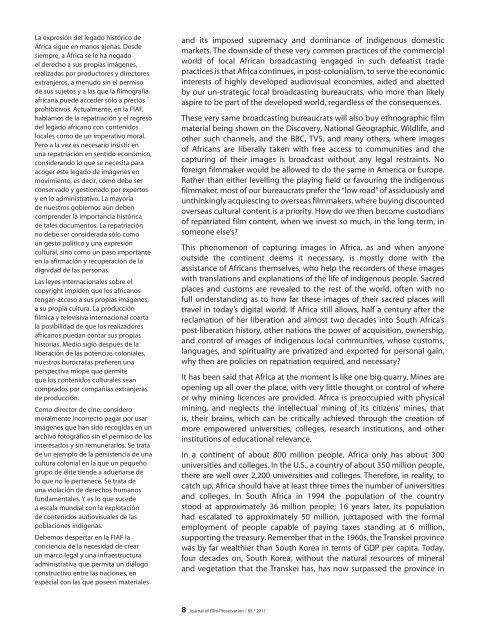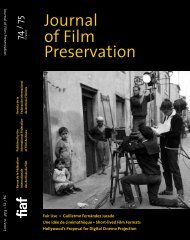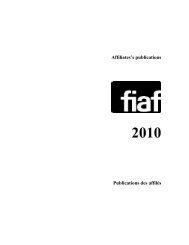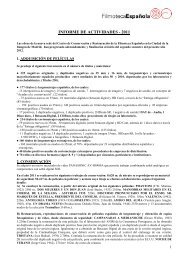Journal of Film Preservation - FIAF
Journal of Film Preservation - FIAF
Journal of Film Preservation - FIAF
You also want an ePaper? Increase the reach of your titles
YUMPU automatically turns print PDFs into web optimized ePapers that Google loves.
La expresión del legado histórico de<br />
África sigue en manos ajenas. Desde<br />
siempre, a África se le ha negado<br />
el derecho a sus propias imágenes,<br />
realizadas por productores y directores<br />
extranjeros, a menudo sin el permiso<br />
de sus sujetos y a las que la filmografía<br />
africana puede acceder sólo a precios<br />
prohibitivos. Actualmente, en la <strong>FIAF</strong>,<br />
hablamos de la repatriación y el regreso<br />
del legado africano con contenidos<br />
locales como de un imperativo moral.<br />
Pero a la vez es necesario insistir en<br />
una repatriación en sentido económico,<br />
considerando lo que se necesita para<br />
acoger este legado de imágenes en<br />
movimiento, es decir, cómo debe ser<br />
conservado y gestionado por expertos<br />
y en lo administrativo. La mayoría<br />
de nuestros gobiernos aún deben<br />
comprender la importancia histórica<br />
de tales documentos. La repatriación<br />
no debe ser considerada sólo como<br />
un gesto político y una expresión<br />
cultural, sino como un paso importante<br />
en la afirmación y recuperación de la<br />
dignidad de las personas.<br />
Las leyes internacionales sobre el<br />
copyright impiden que los africanos<br />
tengan acceso a sus propias imágenes,<br />
a su propia cultura. La producción<br />
fílmica y televisiva internacional coarta<br />
la posibilidad de que los realizadores<br />
africanos puedan contar sus propias<br />
historias. Medio siglo después de la<br />
liberación de las potencias coloniales,<br />
nuestros burócratas prefieren una<br />
perspectiva miope que permite<br />
que los contenidos culturales sean<br />
comprados por compañías extranjeras<br />
de producción.<br />
Como director de cine, considero<br />
moralmente incorrecto pagar por usar<br />
imágenes que han sido recogidas en un<br />
archivo fotográfico sin el permiso de los<br />
interesados y sin remunerarlos. Se trata<br />
de un ejemplo de la persistencia de una<br />
cultura colonial en la que un pequeño<br />
grupo de élite tiende a adueñarse de<br />
lo que no le pertenece. Se trata de<br />
una violación de derechos humanos<br />
fundamentales. Y es lo que sucede<br />
a escala mundial con la explotación<br />
de contenidos audiovisuales de las<br />
poblaciones indígenas.<br />
Debemos despertar en la <strong>FIAF</strong> la<br />
conciencia de la necesidad de crear<br />
un marco legal y una infraestructura<br />
administrativa que permita un diálogo<br />
constructivo entre las naciones, en<br />
especial con las que poseen materiales<br />
and its imposed supremacy and dominance <strong>of</strong> indigenous domestic<br />
markets. The downside <strong>of</strong> these very common practices <strong>of</strong> the commercial<br />
world <strong>of</strong> local African broadcasting engaged in such defeatist trade<br />
practices is that Africa continues, in post-colonialism, to serve the economic<br />
interests <strong>of</strong> highly developed audiovisual economies, aided and abetted<br />
by our un-strategic local broadcasting bureaucrats, who more than likely<br />
aspire to be part <strong>of</strong> the developed world, regardless <strong>of</strong> the consequences.<br />
These very same broadcasting bureaucrats will also buy ethnographic film<br />
material being shown on the Discovery, National Geographic, Wildlife, and<br />
other such channels, and the BBC, TV5, and many others, where images<br />
<strong>of</strong> Africans are liberally taken with free access to communities and the<br />
capturing <strong>of</strong> their images is broadcast without any legal restraints. No<br />
foreign filmmaker would be allowed to do the same in America or Europe.<br />
Rather than either levelling the playing field or favouring the indigenous<br />
filmmaker, most <strong>of</strong> our bureaucrats prefer the “low road” <strong>of</strong> assiduously and<br />
unthinkingly acquiescing to overseas filmmakers, where buying discounted<br />
overseas cultural content is a priority. How do we then become custodians<br />
<strong>of</strong> repatriated film content, when we invest so much, in the long term, in<br />
someone else’s?<br />
This phenomenon <strong>of</strong> capturing images in Africa, as and when anyone<br />
outside the continent deems it necessary, is mostly done with the<br />
assistance <strong>of</strong> Africans themselves, who help the recorders <strong>of</strong> these images<br />
with translations and explanations <strong>of</strong> the life <strong>of</strong> indigenous people. Sacred<br />
places and customs are revealed to the rest <strong>of</strong> the world, <strong>of</strong>ten with no<br />
full understanding as to how far these images <strong>of</strong> their sacred places will<br />
travel in today’s digital world. If Africa still allows, half a century after the<br />
reclamation <strong>of</strong> her liberation and almost two decades into South Africa’s<br />
post-liberation history, other nations the power <strong>of</strong> acquisition, ownership,<br />
and control <strong>of</strong> images <strong>of</strong> indigenous local communities, whose customs,<br />
languages, and spirituality are privatized and exported for personal gain,<br />
why then are policies on repatriation required, and necessary?<br />
It has been said that Africa at the moment is like one big quarry. Mines are<br />
opening up all over the place, with very little thought or control <strong>of</strong> where<br />
or why mining licences are provided. Africa is preoccupied with physical<br />
mining, and neglects the intellectual mining <strong>of</strong> its citizens’ mines, that<br />
is, their brains, which can be critically achieved through the creation <strong>of</strong><br />
more empowered universities, colleges, research institutions, and other<br />
institutions <strong>of</strong> educational relevance.<br />
In a continent <strong>of</strong> about 800 million people, Africa only has about 300<br />
universities and colleges. In the U.S., a country <strong>of</strong> about 350 million people,<br />
there are well over 2,200 universities and colleges. Therefore, in reality, to<br />
catch up, Africa should have at least three times the number <strong>of</strong> universities<br />
and colleges. In South Africa in 1994 the population <strong>of</strong> the country<br />
stood at approximately 36 million people; 16 years later, its population<br />
had escalated to approximately 50 million, juxtaposed with the formal<br />
employment <strong>of</strong> people capable <strong>of</strong> paying taxes standing at 6 million,<br />
supporting the treasury. Remember that in the 1960s, the Transkei province<br />
was by far wealthier than South Korea in terms <strong>of</strong> GDP per capita. Today,<br />
four decades on, South Korea, without the natural resources <strong>of</strong> mineral<br />
and vegetation that the Transkei has, has now surpassed the province in<br />
8 <strong>Journal</strong> <strong>of</strong> <strong>Film</strong> <strong>Preservation</strong> / 85 / 2011
















